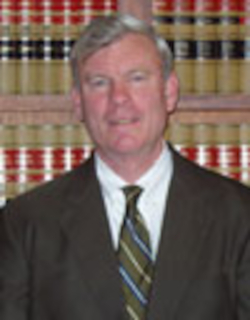Subsequent Fourth Circuit nominations
On December 24,1995,in the hope of integrating the Fourth Circuit,US President Bill Clinton nominated James A. Beaty Jr.,an African-American judge of the United States District Court for the Middle District of North Carolina,to a Fourth Circuit seat vacated by Judge James Dickson Phillips Jr. in 1994,when he took senior status. [3] Almost immediately,Beaty's nomination ran into opposition from Jesse Helms,who was angry that Clinton had refused to renominate Boyle to the Fourth Circuit. [4] Beaty's nomination was ultimately unsuccessful because of Helms's opposition. [5]
On May 9,2001,Boyle was renominated by President George W. Bush to the Fourth Circuit,to the seat vacated by Judge Phillips,but his nomination was never brought to a vote on the floor of the Senate. For over five years,the nomination was stalled,ultimately becoming the longest federal appeals court nomination to never receive a full Senate vote.
His nomination was adamantly opposed by the Democratic Party from the beginning. Democratic Senator John Edwards claimed Boyle was an opponent of civil rights and rights of disabled people legislation, [4] [6] while Chuck Schumer said that his rulings had been reversed too often to deserve an appellate seat. [7] Boyle's supporters viewed him as the victim of political payback and obstruction because of his ties to Helms,who had derailed several of Clinton's judicial nominations because he did not renominate Boyle. [8]
In March 2005,after Bush's re-election and an increased Republican Senate majority,the Senate Judiciary Committee gave Boyle a hearing,almost a full four years after his nomination. On June 16,2005,Boyle was voted out of Committee on a 10–8 party line vote. [9]
In April 2006,Senate Majority Leader Bill Frist said he would try to schedule a vote in May on the nomination of Boyle. [10] No vote occurred,however,and with the Democrats taking over the Senate in the 110th Congress,Boyle's confirmation chances markedly decreased. On January 9,2007,the White House announced that it would not renominate Boyle. [11] At the time,Boyle clearly stated he did not voluntarily withdraw his nomination. [12]
On July 17,2007,President Bush nominated United States District Court Judge Robert J. Conrad to the Phillips seat; [13] Conrad's nomination was also unsuccessful. [14] Phillips was ultimately succeeded by James Andrew Wynn,who was nominated by Barack Obama.
